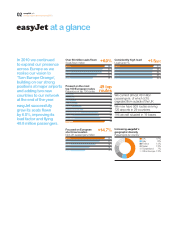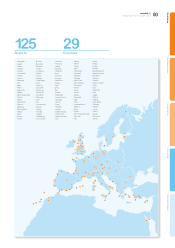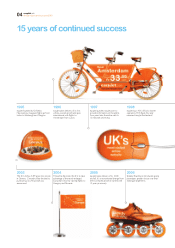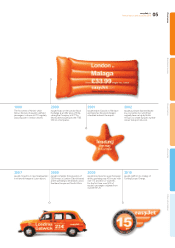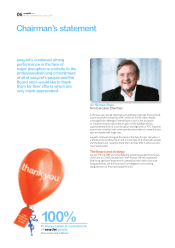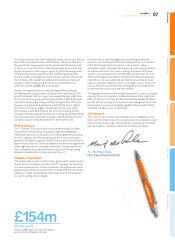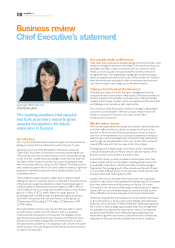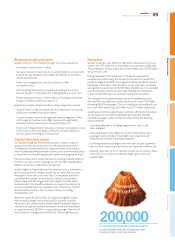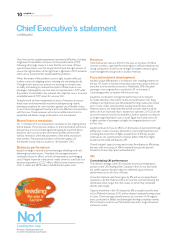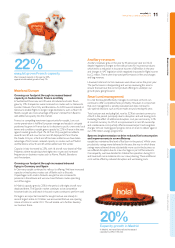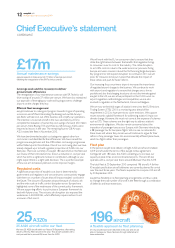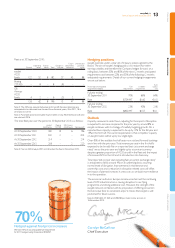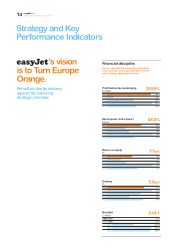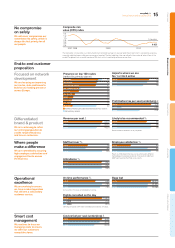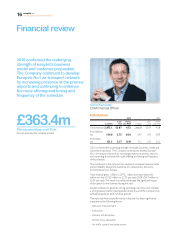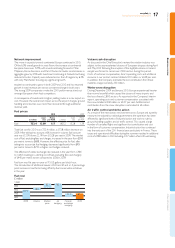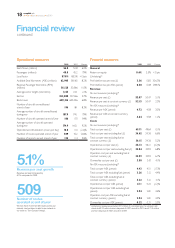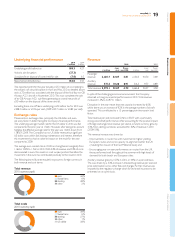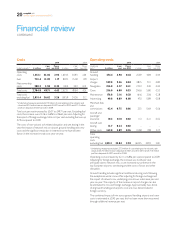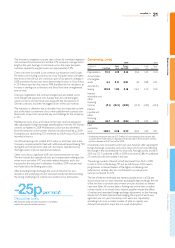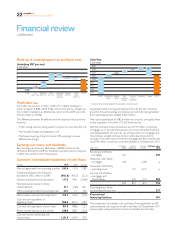EasyJet 2010 Annual Report Download - page 14
Download and view the complete annual report
Please find page 14 of the 2010 EasyJet annual report below. You can navigate through the pages in the report by either clicking on the pages listed below, or by using the keyword search tool below to find specific information within the annual report.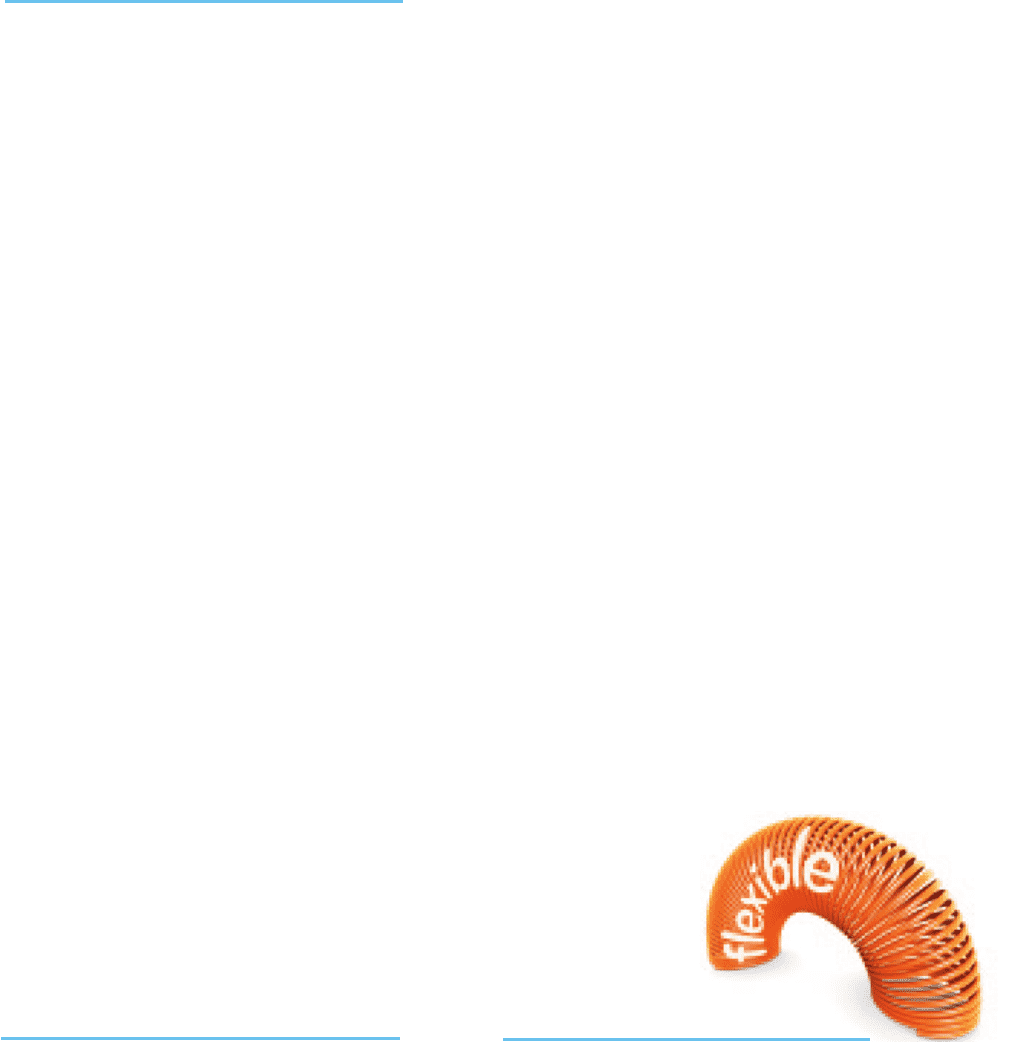
Chief Executive’s statement
continued
Leverage scale and the recession to deliver
procurement efciencies
The renegotiation of our maintenance contract with SR Technics will
drive savings of around £17 million per annum. We have also maintained
our approach of leveraging our scale and buying power to challenge
airports on the charges they levy.
Efcient eet management
easyJet continues to make good progress towards its goal of operating
a common aircraft eet. Eliminating the Boeing and ex-GB Airways
sub-eets will take cost out of the business and simplify our operations.
The intention is to exit all aircraft in the two sub-eets by 2012 to
complete the realisation of ownership cost savings of around £30 million
per annum. Nine Boeing 737s and three ex-GB Airways A320s were
returned to lessors in the year. The remaining four ex-GB Airways
A321s exited the eet in November 2010.
We have benchmarked easyJet cost categories against other low
cost carriers and identied further efciencies. We have named this
programme easyJet Lean and the £190 million cost savings programme
will be folded up into this initiative. One of our cost saving plans we have
already stepped up is to build a greater proportion of A320s into our
eet plan. There are currently 25 easyJet 180 seat A320s in the eet and
our review of their introduction has shown a reduction in cost per seat
which has led to a signicant increase in contribution, although as you
might expect there is a slight yield decrease. This is a perfect example
of how we aim to balance yield and cost to improve margins.
Regulated costs
A signicant proportion of easyJet’s cost base is determined by
governments and regulators and we continue to constructively engage
with them on a number of issues that will impact easyJet’s cost base in
the future. The closure of European airspace because of volcanic ash
and the wide scale air trafc control disruption across Europe have
highlighted some of the weaknesses of the current policy framework.
We are supporting efforts to put in place a European framework to
deal with future crises. The volcanic ash disruption also exposed the
weaknesses in EU2004/261, which effectively requires airlines to act
as insurer of last resort.
We will work with the EU on consumer rules to ensure that they
strike the right balance between the benets that regulation brings
to consumers over its costs to the industry. The strike disruption
to air trafc control is due to the wider economic pressures facing
Europe and union concerns about the forthcoming Single European
Sky programme. We expect disruption to continue in 2011; we will
press for measures to be put in place that alleviate the impact of
these strikes and push for faster reform.
Our increasing focus on primary airports increases the importance
of regulated airport charges to the business. We continue to work
with airports and regulators to ensure that charges are as low as
possible and also that charging structures do not discriminate against
easyJet. In the UK, we are active participants in the CAA’s work on
airport regulation methodologies and competition; we are also
involved in regulation in theNetherlands, France and Belgium.
We are now at the initial stages of aviation’s entry into the EU Emissions
Trading System (ETS); 2010 is a monitoring year ahead of the
requirement in 2012 to have permits to cover emissions. We support
moves towards a global framework for addressing aviation’s impact on
climate change. However, this must not come at the expense of schemes
such as ETS. These schemes are the right way to address aviation’s
environmental obligations. We also remain concerned about the
imposition of passenger taxes across Europe, with Germany introducing
a €8 passenger tax for European ights. We can see no rationale for
these taxes and where they remain we will continue to argue for their
reform of any passenger taxes into environmentally efcient plane taxes,
which tax ights rather than passengers.
Fleet plan
In the period, easyJet took delivery of eight A320 aircraft and nineteen
A319 aircraft under the terms of the easyJet Airbus agreement.
Congured with 180 seats, the A320 is enabling us to increase our
capacity at peak times at slot constrained airports. The aircraft also
operates with a cost per seat that is around 6% lower than the A319.
The total eet at 30 September 2010 comprised 196 aircraft. A further
45 easyJet specication aircraft deliveries are currently planned for arrival
over the next three years. The eet is expected to comprise 220 aircraft
by 30 September 2013.
easyJet has exibility in its eet planning arrangements and thus is able
to manage the total number of aircraft in the eet through a combination
of deferrals and lease extensions.
25 A320 aircraft within our fleet
We have 25 A320 aircraft within our fleet at 30 September, after taking
delivery of 8 new A320 aircraft in the year. This aircraft operates with a
cost per seat that is around 6% lower than the A319.
25 A320s
Annual maintenance savings
easyJet expects to make around £17 million of savings per annum
following the renegotiation of the SR Technics contract.
£17m
A flexible approach to fleet planning
27 new aircraft have been delivered in the year and we are
able to manage our future fleet size through deferrals and
lease extensions.
196 aircraft
12 easyJet plc
Annual report and accounts 2010


